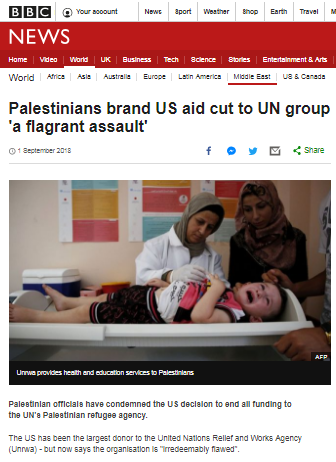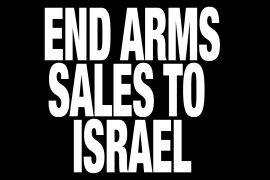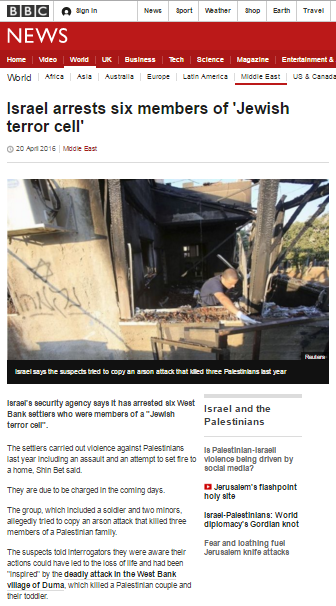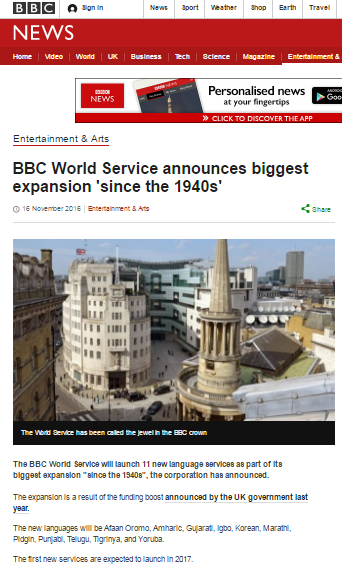On September 1st the BBC News website replaced its original report on the topic of the US administration’s decision to cut funding to UNRWA (discussed here) with an article titled “Palestinians brand US aid cut to UN group ‘a flagrant assault’“.
As may be expected given that choice of headline, 16.3% of the report’s word count was given over to criticism of the US decision from various Palestinian factions, including the PLO (together with a link) and the Hamas terror group. An additional 48 words were used to describe Palestinian denunciation of previous unrelated US Administration decisions. A further 13.7% of the report’s word count was devoted to amplification of statements from UNRWA’s spokesman Chris Gunness, meaning that in all, 30% of the article was devoted to informing BBC audiences of condemnations of the US move.
Readers were told that:
“The US has been the largest single donor to Unrwa, providing $368m (£284m) in 2016 and funding almost 30% of its operations in the region.
But in January, the administration of President Donald Trump withheld more than half of its planned funding to Unrwa, saying it would keep back $65m unless the body carried out “reforms”.”
The BBC chose not to explore the question of why, given that warning, no reforms were made to UNRWA during the last eight months or whether other countries stepped forward with increased contributions as the US suggested in January.
Portrayal of the US announcement itself included a link to the US State Department’s statement.
“The state department said the US had shouldered a “very disproportionate share of the burden of Unrwa’s costs”, and that the international community should contribute more.
It has also said it is unhappy that Unrwa has kept expanding the number of people eligible for assistance, and says its business model is “simply unsustainable and has been in crisis mode for many years”.
This links to a wider disagreement over which Palestinians are refugees with a right to return to the homes they fled following the 1948 Arab-Israeli war.
The UN says there are about five million Palestinian refugees, including the descendants of people who fled the 1948 war.
However, the US and Israel disagree with how this number is calculated, and say the number of Palestinian refugees should be much smaller.”
Once again the BBC failed to provide its audiences with a factual view of the background to this story that includes UNRWA’s gradual expansion of the term ‘refugee’ to include people who do not meet that description under its original mandate – as well as millions of people with Jordanian or Palestinian citizenship – and its failure to promote resettlement of refugees.
Readers were not told that UNRWA employs 30,000 members of staff to take care of 5.3 million registered clients while the UNHCR has fewer than 11,000 staff dealing with 17.2 million refugees in 130 countries and they were not given an explanation as to why refugee camps still exist in areas long under the control of either the Palestinian Authority or Hamas.
Perhaps most importantly, BBC audiences were not told that UNRWA’s seventy-year perpetuation and exacerbation of the Palestinian refugee issue does nothing to contribute to the prospects of the peaceful solution to the conflict supposedly backed by most Western nations – including the UK – as Einat Wilf explains:
“Why does this matter for peace? Because if millions of Arabs who are citizens of Jordan and the Palestinian Authority, or inhabitants of Syria and Lebanon, claim to be refugees from what is today Israel, even though they were never born there and never lived there, and demand that as a result of this refugee status they be given the right to relocate to Israel (‘the right of return’), then the whole basis for peace by means of two states for two people crumbles. If Israel with its 6 million Jews and more than 1.5 million Arabs has to absorb between 5 and 8 million Palestinians then the Jews will be relegated again to living as a minority among those who do not view them as equals; the only country in which the Jews are a majority and can exercise their right to self-determination would be no more.”
Since this story first emerged in January the BBC has had ample time in which to provide its audiences with the full range of information essential for its understanding. Instead, BBC audiences have seen repeated promotion of UNRWA campaigning and have been given a portrayal of the issue which overall is unbalanced and severely lacking in essential information.
Related Articles:
BBC News reporting on US aid cut to UNRWA – part one
BBC WS listeners get a homogeneous view of US aid to Palestinians – part one
BBC WS listeners get a homogeneous view of US aid to Palestinians – part two
BBC News report on UNRWA funding story omits relevant background
BBC WS Newsday coverage of UNRWA aid story – part one
BBC WS Newsday coverage of UNRWA aid story – part two
Falsehoods go uncontested on BBC World Service – part one
Falsehoods go uncontested on BBC World Service – part two
Three BBC articles on US aid promote an irrelevant false comparison
BBC’s Yolande Knell amplifies UNRWA’s PR campaign
BBC WS facilitates UNRWA PR yet again – part one
BBC WS facilitates UNRWA PR yet again – part two
Unbalanced promotion of UNRWA PR on BBC World Service radio




